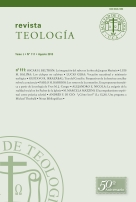Por favor, use este identificador para citar o enlazar este ítem:
https://repositorio.uca.edu.ar/handle/123456789/7618| Campo DC | Valor | Lengua/Idioma |
|---|---|---|
| dc.contributor.author | Irrazábal, Gustavo Roque | es |
| dc.date.accessioned | 2019-06-20T00:28:04Z | - |
| dc.date.available | 2019-06-20T00:28:04Z | - |
| dc.date.issued | 2013 | - |
| dc.identifier.citation | IRRAZÁBAL, Gustavo R., Tras el Concilio : perspectivas de la doctrina conciliar sobre la conciencia [en línea]. Teología, 111 (2013). Disponible en: https://repositorio.uca.edu.ar/handle/123456789/7618 | es |
| dc.identifier.uri | https://repositorio.uca.edu.ar/handle/123456789/7618 | - |
| dc.description.abstract | Resumen: Si bien el Concilio Vaticano II no logró elaborar un documento específico sobre la teología moral, su contribución a esta disciplina ha sido decisiva. Entre sus más importantes aportes, se cuenta la doctrina sobre la conciencia de Gaudium et spes 16. Pese a su indudable ambivalencia, este texto propone una visión personalista del tema, que progresivamente iría transformando el método de la teología moral, donde el centro ya no es la ley, sino el sujeto moral, con su capacidad para discernir las exigencias del amor en el “aquí y ahora” de la historia. Lejos de estimular el individualismo y el relativismo, este giro hacia el sujeto ha suscitado un mayor compromiso de los eticistas católicos en la lucha contra todas aquellas situaciones de sufrimiento e injusticia que amenazan la dignidad del hombre. | es |
| dc.description.abstract | Abstract: Even though the Second Vatican Council II was not able to elaborate a specific document on Moral Theology, its influence on this discipline has been decisive. One of its most important contributions is the doctrine on conscience in Gau dium et spes 16. In spite of its undeniable ambivalence, this text contains a personalist vision of this matter, which would progressively transform the moral method, whose centre would no longer be the law, but the moral subject, endowed with the capacity to discern the objective demands of love in the “here and now” of history. Far from fostering attitudes of individualism or relativism, this shift to the subject has stimulated a greater engagement of catholic ethicists in the struggle against all those situations of suffering and injustice which threaten human dignity. | es |
| dc.format | application/pdf | es |
| dc.language.iso | spa | es |
| dc.publisher | Universidad Católica Argentina. Facultad de Teología | es |
| dc.rights | Acceso Abierto | es |
| dc.rights.uri | https://creativecommons.org/licenses/by-nc-sa/4.0/ | es |
| dc.source | Teología, 111 | es |
| dc.subject | CONCILIO VATICANO II | es |
| dc.subject | CONCIENCIA MORAL | es |
| dc.subject | TEOLOGIA MORAL | es |
| dc.subject | AUTORIDAD | es |
| dc.title | Tras del Concilio : perspectivas de la doctrina conciliar sobre la conciencia | es |
| dc.title | In pursue of the Council : perspectives of the conciliar doctrine on conscience | es |
| dc.type | Artículo | es |
| uca.path | Teología|2013 Tomo L nº 111 | es |
| uca.disciplina | TEOLOGIA | es |
| uca.filename | /home/data-uca-generic/folder_revistas/Revistas varias/Teologia/111/tras-concilio-perspectivas-doctrina/metadata.xml | es |
| uca.issnrd | 1 | es |
| uca.affiliation | Fil: Irrazábal, Gustavo. Pontificia Universidad Católica Argentina. Facultad de Teología; Argentina | es |
| uca.orden | 04 | es |
| uca.version | publishedVersion | es |
| item.fulltext | With Fulltext | - |
| item.grantfulltext | open | - |
| item.languageiso639-1 | es | - |
| Aparece en las colecciones: | TEO - 2013 Tomo L nro. 111 | |
Ficheros en este ítem:
| Fichero | Descripción | Tamaño | Formato | |
|---|---|---|---|---|
| tras-concilio-perspectivas-doctrina.pdf | 360,32 kB | Adobe PDF |  Visualizar/Abrir |
Visualizaciones de página(s)
284
comprobado en 30-abr-2024
Descarga(s)
193
comprobado en 30-abr-2024
Google ScholarTM
Ver en Google Scholar
Este ítem está sujeto a una Licencia Creative Commons

